42 all hazardous chemical labels must be permanent
- Division of Research Safety | Illinois Make sure the label remains legible. Use a permanent marker that does not dissolve in water or the solvent used, or attach an adhesive label with the required information. For long term storage, check the label periodically (every six months) and replace it if it has become illegible. Safety data sheets | Safe Work Australia Safety data sheets If you supply, use or store hazardous chemicals, you must keep copies of the SDS in your workplace. If you manufacture or import chemicals, you are responsible for making a correct SDS for each hazardous chemical. Supporting information Understanding safety data sheets - Fact sheet Hazardous chemicals Labelling chemicals
Hazardous Waste Labeling and Marking 101 Hazardous Waste Labeling Labels are the diamond-shaped warning placards meant to convey the associated hazard of the contained waste by the DOT. Examples include "flammable liquid", "poison", and "corrosive". (Learn more about Hazmat Placards) Each label needs to be: at least 4" x 4", the appropriate print style, color, and border, and
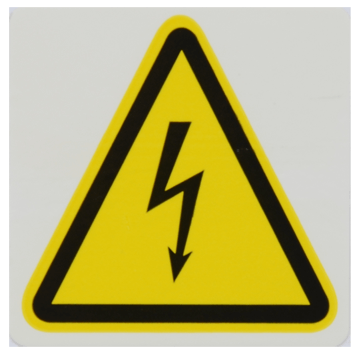
All hazardous chemical labels must be permanent
United States Product Labeling Requirements: An Overview - Compliance Gate The Federal Trade Commission (FTC) establishes labeling requirements for importers and manufacturers to adhere to with regard to clothing and textile products. For example, labels on clothing and textiles should be obvious, accessible, and contain information such as the following: Fiber content (e.g. 100% cotton) Chemical Container Labels | EHS - University of Washington As of June 1, 2015, labels on chemicals/products shipped from the manufacturer must be consistent with the Globally Harmonized System of Classification and Labeling of Chemicals (GHS) as required by Washington Administrative Code (WAC) 296-901-140. The WAC requires six elements on original labels (as of June 1, 2015): Product name Chemical Hygiene Plan | PennEHRS - University of Pennsylvania All containers of hazardous materials 4-L or larger must be labeled with both the name and the chemical hazards. Chemical hazard labels must be affixed to or written on any semi-permanent container of hazardous materials in the lab such as stock solutions and acid and base baths. It is highly recommended that pre-labeled bottles are purchased ...
All hazardous chemical labels must be permanent. Labeling requirements of hazardous chemicals. | Occupational Safety and ... The using employer has the responsibility to ensure that each container of hazardous chemical in the workplace is labeled, tagged, or marked with the following information: i) Identity of the hazardous chemical (s); ii) Appropriate hazard warnings. Ms. Dietrich's letter indicates that Dr. Dietrich's office is labeling all hazardous chemical ... 11 Rules for Safe Handling of Hazardous Materials To employees, they'll be "our" rules rather than "their" rules. That way, people will be more likely to follow them. Rule #1. Follow all established procedures and perform job duties as you've been trained. Rule #2. Be cautious and plan ahead. Think about what could go wrong and pay close attention to what you're doing while you work. Rule #3. All news - ECHA - Europa Helsinki, 28 April 2017 - Companies must classify, label and package their hazardous chemicals appropriately before placing them on the market. From 1 June 2017, all chemical products placed on the market have to be labelled in accordance with the Classification, Labelling and Packaging (CLP) Regulation. This marks the end of the transitional ... A Guide to Pipe Marking Standards | Creative Safety Supply 1.4" to 2.4" Pipe Width x 8" Label Length = 0.7" Text Height. 2.5" to 6.7" Pipe Width x 12" Label Length = 1.3" Text Height. 6.8" to 10" Pipe Width x 24" Label Length = 2.5" Text Height. Over 10" Pipe Width x 32" Label Length = 3.5" Text Height. Visibility and frequency of pipe markings is integral to pipe marking ...
Secondary Container Labels 101: HazCom and WHMIS - ERA Environmental All original labels cannot be removed, altered, or defaced and if a replacement label is needed, no information can be omitted from the first to the second label. There are two mandatory pieces of information which need to be included on the Secondary Labels: the identity of the hazardous chemicals within the product and the hazards, either ... All news - ECHA - Europa 22 harmful chemicals added to PIC - exporters must notify from July EU exporters are now required to notify their intention to export 22 chemicals following an amendment to the PIC Regulation. The amendment also bans the export of four chemicals. The update was published on 20 April 2022 and will start to apply on 1 July 2022. Container labeling requirements under the OSHA Hazard Communication ... "Chemical manufacturers, importers, or distributors shall ensure that each container of hazardous chemicals leaving the workplace is labeled, tagged, or marked in accordance with this section in a manner which does not conflict with the requirements of the Hazardous Materials Transportation Act {U.S.C. 1801 et seq.} and regulations issued under the Act by the Department of Transportation." Labelling and safety data sheets | EPA A workplace has requirements for SDSs and labels. These can be viewed on the hazardous substances section of the WorkSafe website. For concerns about non-compliant SDSs or labels contact the hazardous substances compliance team at hscompliance@epa.govt.nz. EPA Notices
Hazard Communication OSHA Flashcards | Quizlet Before a chemical can be shipped, it must have an appropriate warning label attached to the container and the applicable SDS must be provided prior to or at the time of shipment. An easy way to remember the differences is that an SDS is a document that each chemical manufacturer, distributor, or importer must provide for each hazardous chemical. OSHA: Container Labels Flashcards | Quizlet Which of the following hazards could you expect if you see the pictogram? -Irritants -Skin sensitizers -Acute toxicity -Narcotic effects This pictogram represents three classes of hazards? -Skin corrosion and burns -Eye damage -Corrosive to metals Which pictogram is used for the most hazardous categories of acute toxicity? Skull and crossbones Labelling of chemicals - OSHWiki Labelling of chemicals is based on their classification, which involves determining the hazard category to which the chemical belongs and assigning a codified regulatory phrase describing the type of hazard (hazard statement according to the CLP regulation, risk phrase in the pre-existing European regulations) (see chapter 'CLP regulation' below). GHS Labeling Requirements: The Definitive Guide [2021 Update ... - Luminer Learn all about the Globally Harmonized System (GHS) requirements for labeling chemicals & hazardous materials, with history, examples and pictograms. Customer Login. Connect on LinkedIn; Connect on Google+; info@luminer.com 732-886-6557. ... All hazardous chemical labels must be made with six different indicators. These GHS label requirements ...
Tattoo and permanent makeup substances | EPA The risks from tattoos and permanent makeup come from both the chemical composition of the ink used and infection caused by unsafe practices. All hazardous substances require an approval under the Hazardous Substances and New Organisms Act 1996 (HSNO Act). ... The label must include the product name, the batch number or other reference used by ...
Chemical Storage Safety OSHA Requirements - SafetyInfo Some chemicals may adversely affect paint 2 - Polyethylene Use for storing acids/caustics and other corrosive chemicals. 3- Stainless Steel Use when chemical purity is critical Y= Yes N=No *May discolor solvent if water is present CAUTION: Resistance to mixed solvents is unpredictable.
GHS Label Requirements, Guidelines, and Best Practices In general, "Danger" is usually reserved for chemicals that can cause immediate harm or permanent damage. Less immediate hazards use "Warning." For example, flammable materials use "Danger" as their signal word, while combustible materials use "Warning." Only one word is used on the label.
Container Labeling | Office of Environmental Health and Safety | ECU Labels of incoming manufactured products or chemicals must contain 6 key elements: Signal Word; Pictograms; Manufacturer Information; Precautionary Statement(s) Hazard Statement(s) Product name or identifiers; OSHA requires that labels on incoming containers of hazardous materials must not be removed or defaced until the container is empty and rinsed.
PDF Laboratory Safety Labeling and Transfer Facts of Chemicals of Chemicals Permanent Container Labels . Employers must ensure that no worker uses, stores, or . allows any other person to use or store any hazardous . substance in a laboratory if the container (including . bags, barrels, bottles, boxes, cans, cylinders, drums . and reaction vessels) does not meet the following . labeling requirements in OSHA's Hazard Communication
Arc Flash Labeling Requirements | Comply with 2021 NFPA 70E Old Label Versions. The recent update allows labels applied prior to the effective date of this edition of the standard to be acceptable if they complied with the requirements for equipment labeling in the standard in effect at the time the labels were applied (unless changes in electrical distribution system render the label inaccurate).
Hazardous Waste Storage & Labeling | Safety Services To comply with regulations regarding the accumulation of hazardous waste on-site, all hazardous waste must be labeled with the following information: The words "Hazardous Waste" name and address of generator date of initial accumulation date that the 90-day period begins the composition and physical state of the waste
Storage Tanks: Labeling Requirements - Bluefield Process Safety It allows for "signs, placards, process sheets, batch tickets, operating procedures, or other such written materials", as long as this written material unambiguously conveys the product identifier and the general information about the hazards of the contents. The NFPA Diamond and the HMIS Bars
WHMIS 2015 - Hazard Classes and Categories : OSH Answers If the product meets any of the criteria for a hazard class, it is known as a hazardous product. All hazardous products must be labelled according to the regulations, and must have a corresponding Safety Data Sheet (SDS). The hazard class and category will be provided in Section 2 (Hazard Identification) of the SDS.
WHMIS Workplace Labeling - Environmental Health & Safety Below are examples of three different workplace labels that all meet the WHMIS regulation criteria. Example 1. The UofT Workplace Label template is formatted to print on Avery 60506 labels (available at UofT MedStore, Amazon, Staples and Avery ). Open the template in Adobe (not your web browser), type in the required information for each label ...
WHMIS 2015 - Labels : OSH Answers - Canadian Centre for Occupational ... Yes. There are two main types of WHMIS labels: supplier labels, and workplace labels. Suppliers of hazardous products are required to apply a label that meets the requirements of the Hazardous Products Regulations. If the hazardous product is always used in the container with the supplier label, no other label is required.
Chemical Hygiene Plan | PennEHRS - University of Pennsylvania All containers of hazardous materials 4-L or larger must be labeled with both the name and the chemical hazards. Chemical hazard labels must be affixed to or written on any semi-permanent container of hazardous materials in the lab such as stock solutions and acid and base baths. It is highly recommended that pre-labeled bottles are purchased ...
Chemical Container Labels | EHS - University of Washington As of June 1, 2015, labels on chemicals/products shipped from the manufacturer must be consistent with the Globally Harmonized System of Classification and Labeling of Chemicals (GHS) as required by Washington Administrative Code (WAC) 296-901-140. The WAC requires six elements on original labels (as of June 1, 2015): Product name
United States Product Labeling Requirements: An Overview - Compliance Gate The Federal Trade Commission (FTC) establishes labeling requirements for importers and manufacturers to adhere to with regard to clothing and textile products. For example, labels on clothing and textiles should be obvious, accessible, and contain information such as the following: Fiber content (e.g. 100% cotton)
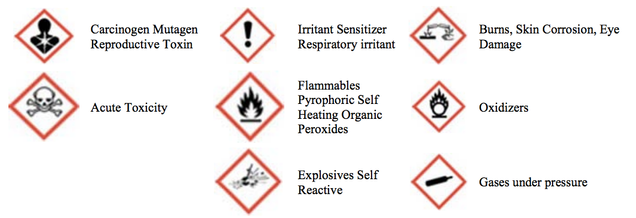




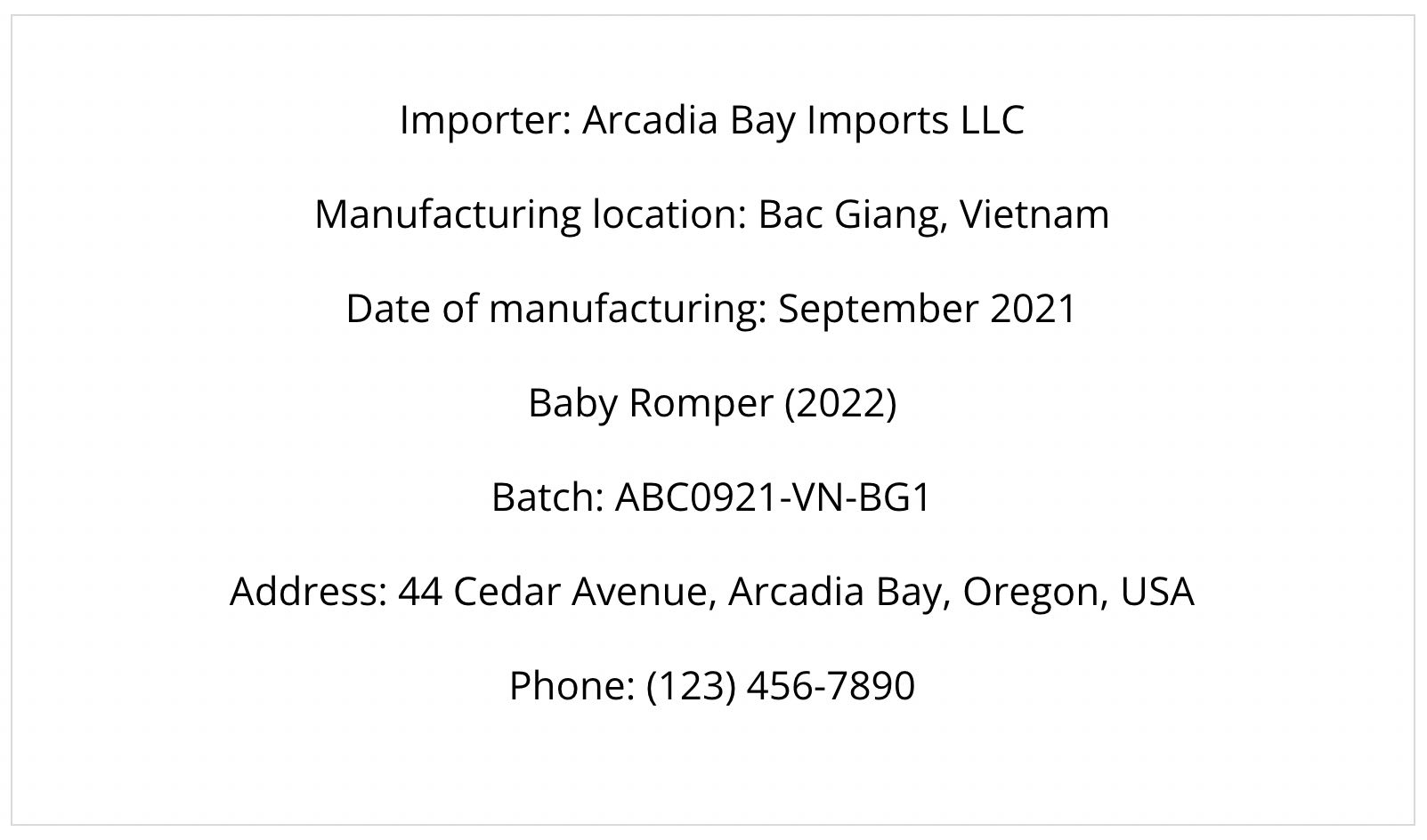
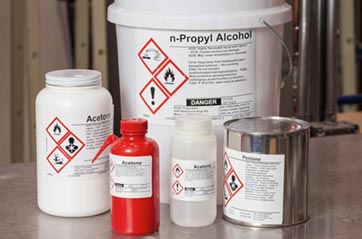
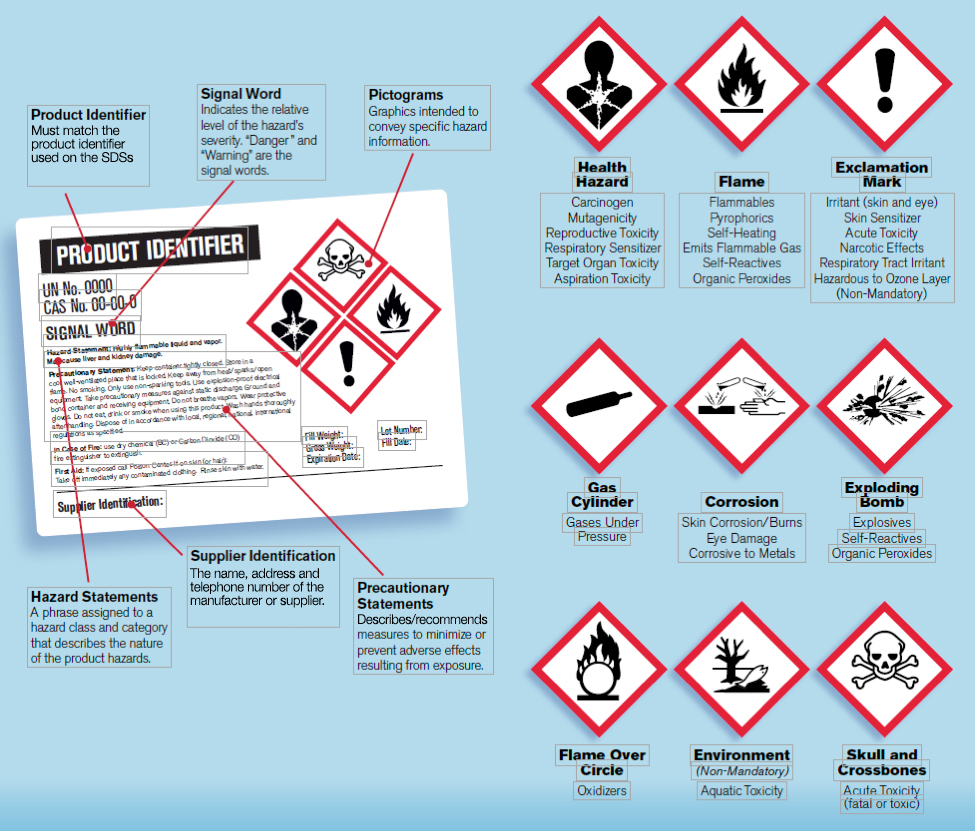
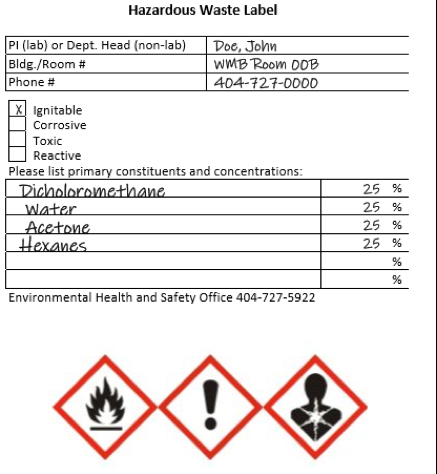
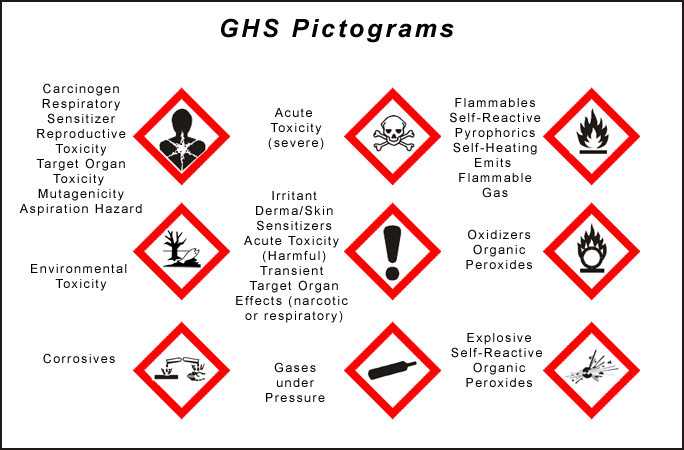


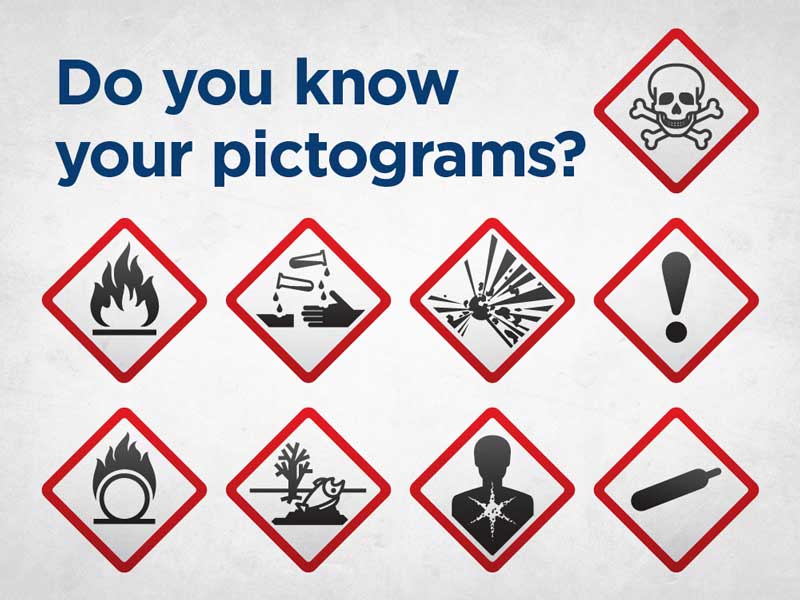




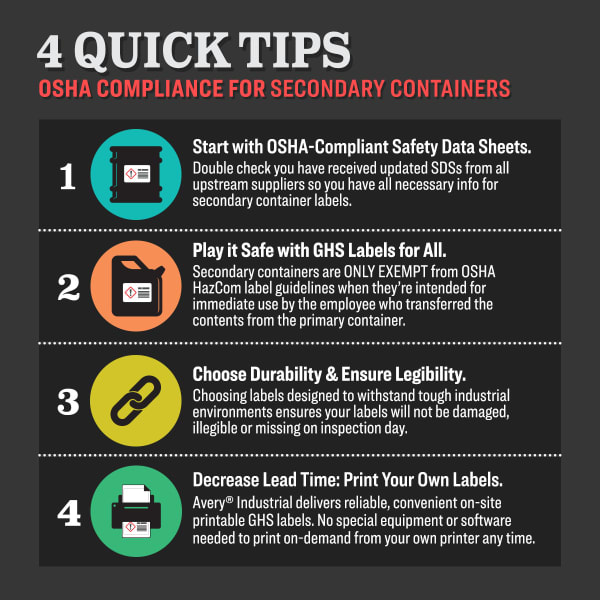
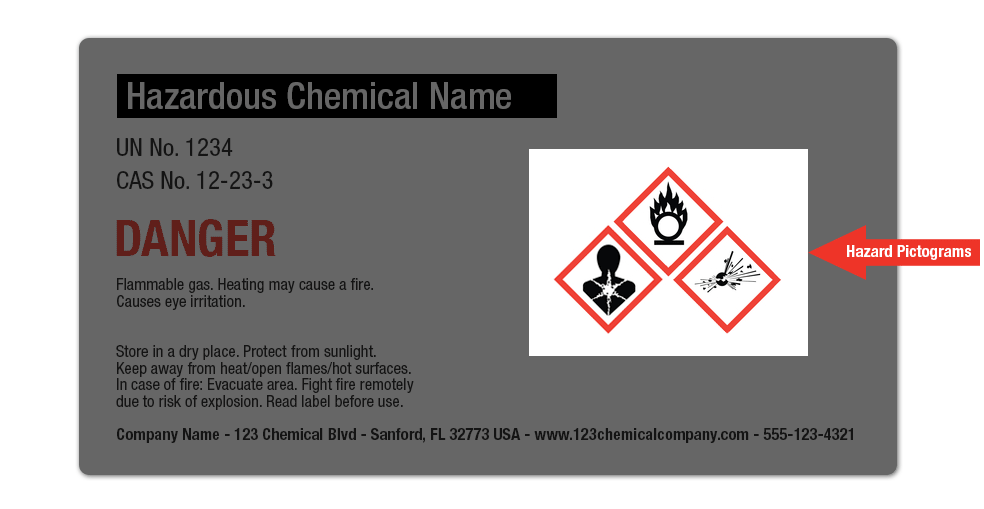

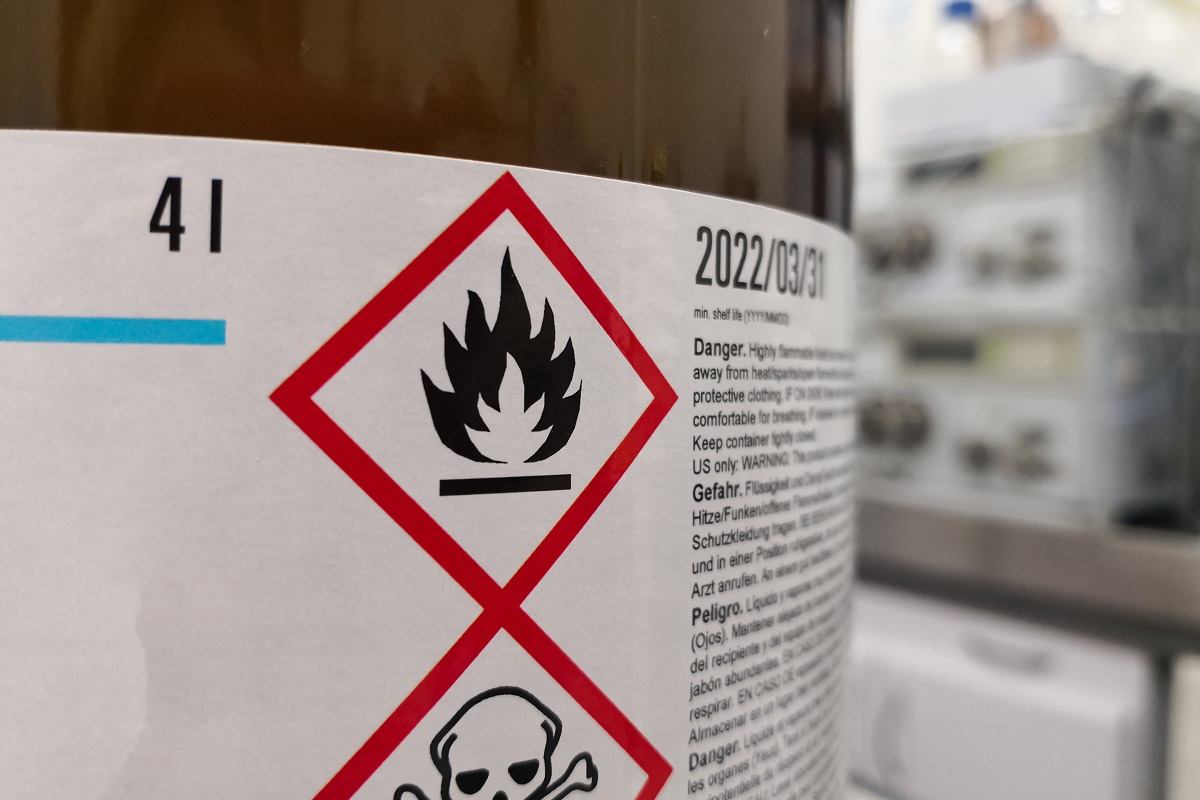







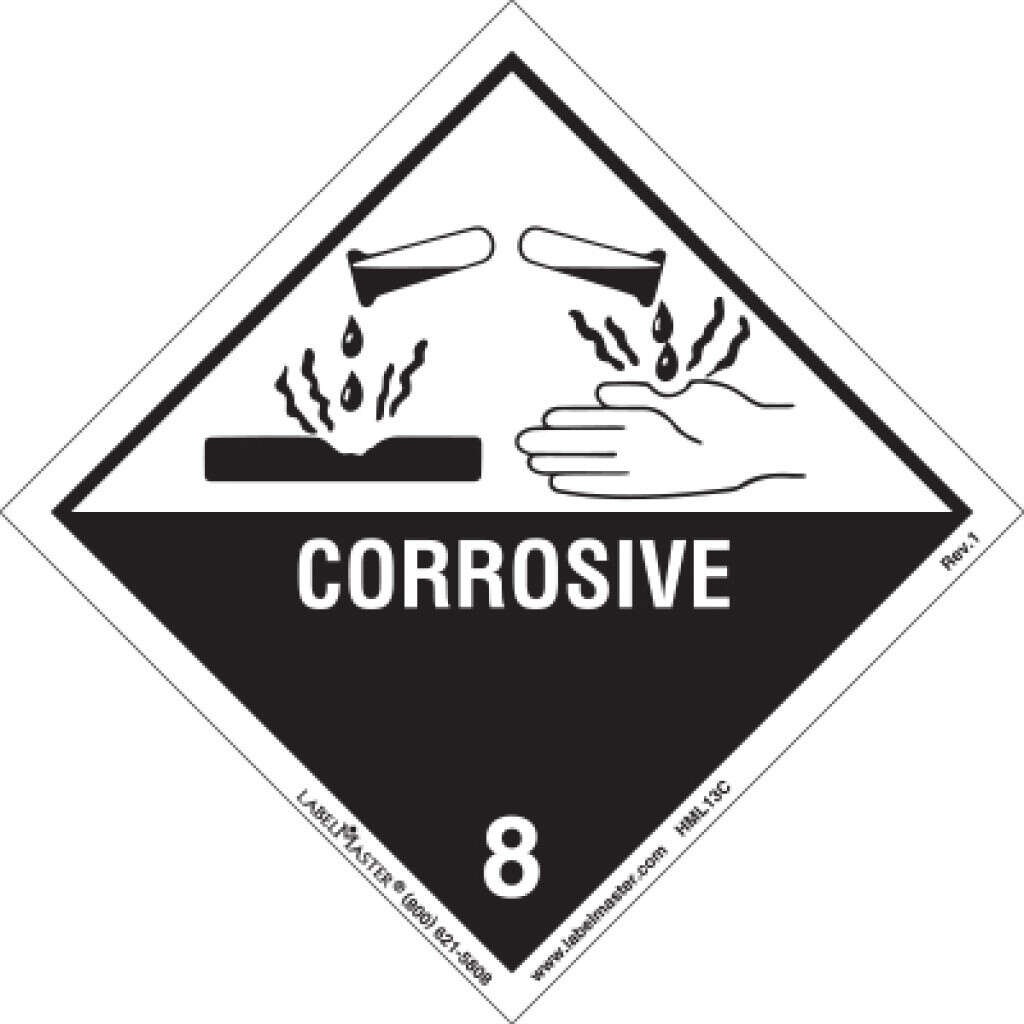
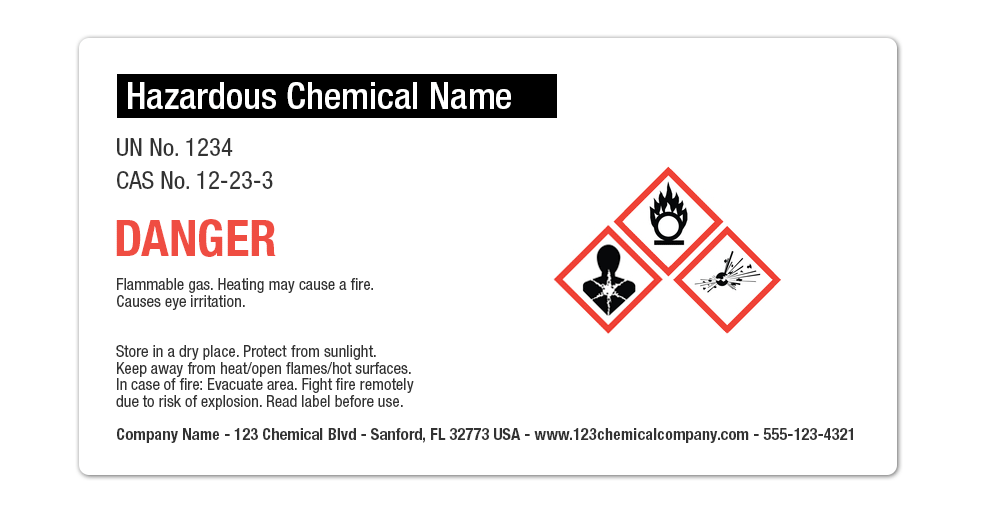
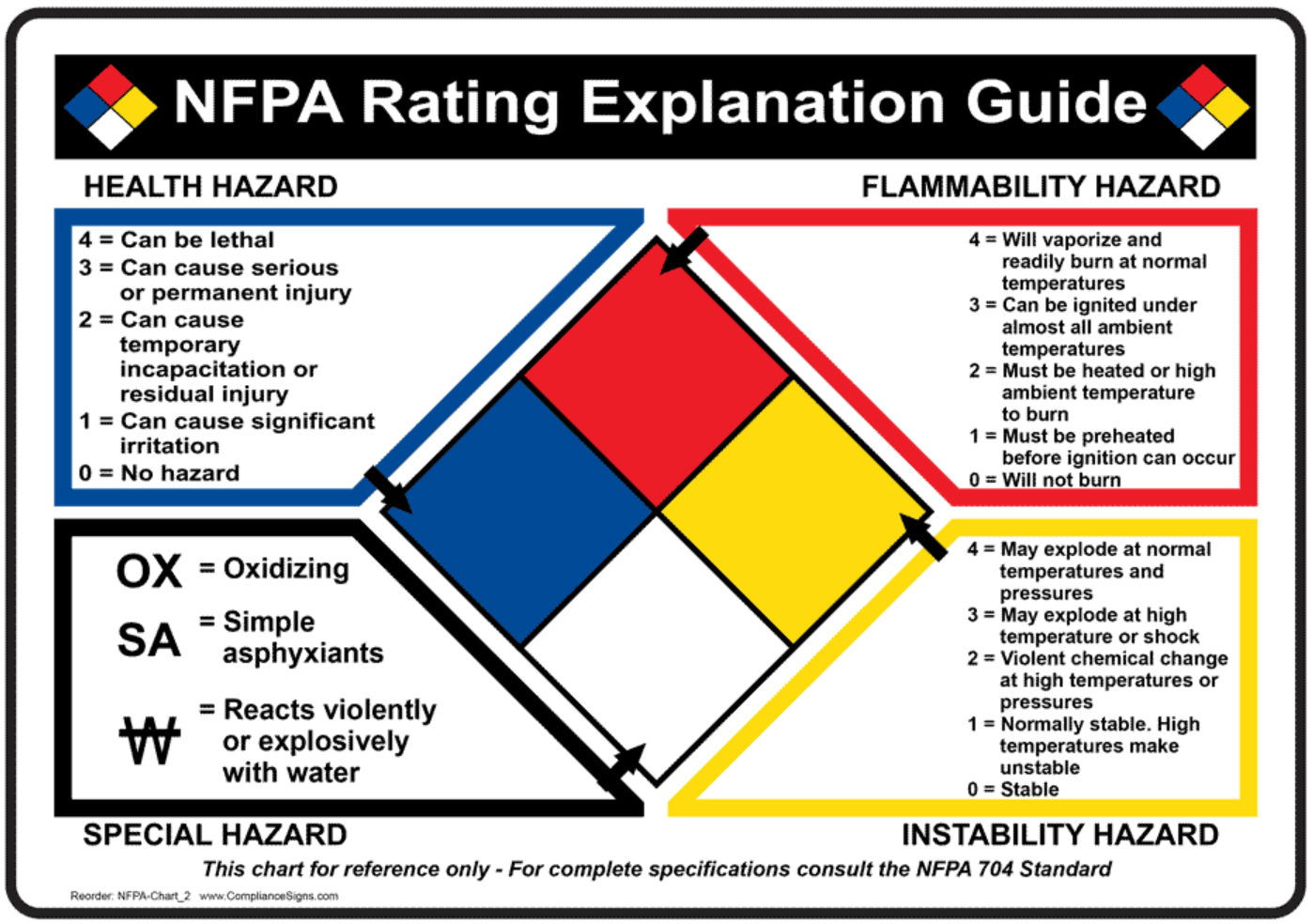

Post a Comment for "42 all hazardous chemical labels must be permanent"